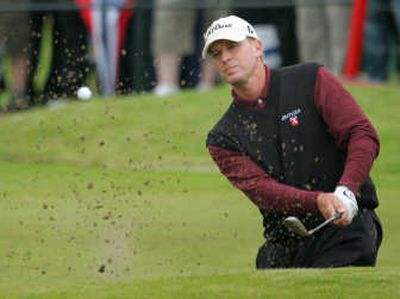Stricker’s begging days may be over

CARNOUSTIE, Scotland – The worst part was having to beg for work. Steve Stricker did it because that’s what failed players do if they don’t want to end up working behind the counter at the local country club.
The routine was the same every week.
Pick up the phone and call sponsors. If that doesn’t work, tournament directors are next on the speed dial. Explain your credentials. Remind them that you were once the next big thing before your thing started to go bad. If they still balk, tell them you have a growing family and really need to make a living.
If you’re lucky, one will let you in. If you’re real lucky, you’ll have such a good week that the next one will be forced to let you in.
Getting in the British Open wasn’t the goal. Playing in the final group today was merely a dream.
An invitation to the Chrysler Classic was just fine.
“That’s the hard part, when you don’t have really much of a status,” Stricker said. “You’re begging your way into tournaments, and you never knew when you were going to play.”
It helped that the guy doing the begging was known as perhaps the ultimate nice guy on the PGA Tour. But niceness only gets you so far, and there comes a time when you either have to deliver on the course or start making plans for being off of it.
Stricker did just that, taking advantage of a few special invitations early last year and playing so well that he not only regained his tour card but was named comeback player of the year.
That got him in the majors, including the British Open after a four-year absence. And a sparkling 7-under 64 Saturday got him into the final group in the final round with Sergio Garcia.
“Obviously this is why all of us are here,” Stricker said. “These four tournaments throughout the year are ultimate goals for everyone to win.”
Stricker’s story of success and failure in golf is a familiar one, but unlike most players he’s remarkably candid in talking about both the doubts that afflicted him about his swing and his desire to play.
He had turned out to be more shooting star than rising star.
With his wife lugging the bag, Stricker won twice in 1996 and everything came easy. He was on the President’s Cup team, and even the celebrated debut of Tiger Woods did nothing to dent his confidence.
But there were flaws in his game. Stricker rarely hit a driver until his junior year in college, but on the tour it was a club he both needed and fought with.
He’s 40 now, not the young prospect he once was, but still plenty young to compete with the big hitters. He’s still a magician with the putter, and some hard work and hard thinking have helped him regain his edge.
At the U.S. Open, Stricker held a share of the lead in the final round before making a double bogey on the 10th hole at Oakmont, and he finished second in the AT&T earlier this month. Now he plays in the final group in the British Open, with nothing to lose after spotting Garcia a three-shot lead.
There will be some jitters, but he’s beginning to understand more how to deal with them, too.
“It gets emotional. It does for me, at least,” Stricker said. “But those are the things that I need to work on and try to fight the results out of your mind … try to just stick into the present and hit the shot at hand.”
If he does, there’s a decent chance he could be raising the claret jug Sunday night, a major champion at last and proof that nice guys can finish first.